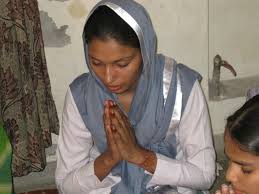


The campaign for justice continues
2009 was without a doubt the worst year of persecution against Christians in Pakistan in the last decade. More often than not, the attacks, arrests, detentions and murder of no less than 130 Christians can be traced back to the blasphemy laws. Although other religious minorities have suffered their fair share of false blasphemy claims, the wave of “blasphemy hysteria” in the last year has been levelled at Christians more than any other minority community.
Under the blasphemy laws, a charge can be brought against another person with the testimony of just one person and the suspect is immediately detained in jail where he can remain for months or years before the case is finally brought to trial. Anyone found guilty of desecrating the Koran faces execution or a lengthy sentence in a prison, where conditions are poor.
As such, the blasphemy laws are an easy tool in the hands of Muslim extremists who, unlike the Christians, have little to fear in the way of legal repercussions. More often than not, they get off scot free for the atrocities they commit against Christians.
What is so alarming is not merely that the blasphemy laws are being misused to settle personal scores and suppress Christians. It is also the fact that they are fomenting hatred and divisions between the majority Muslim population and the Christian minority. By singling out and protecting only one religion i.e. Islam, these laws serve only to elevate Islam to the status of a “superior” religion. It is little surprise, therefore, that Muslim extremists see the blasphemy laws as a green light from the state to discriminate against fellow Pakistanis who do not share the same religion. The result is hatred towards people of minority faiths and unhesitating acts of violence to suppress them.
This underlying hatred could be seen clearly in several incidents last year. In April, four Christians were injured and one died in an attack on a Christian colony in Karachi. In July, an attack on the village of Bahmani Wala resulted in 100 houses being burnt to the ground, looted and vandalised, and the assault of women and girls. Then in August, eight Christians were shot or burnt alive in Gojra in Punjab when the Christian community was attacked by a mob of 3,000 Christians over alleged blasphemy – the bloodiest act of violence against Christians in Pakistan to date. In the same month, a factory owner in Lahore was murdered by his employees simply for removing an outdated Islamic calendar from the wall. A few days later, Fanish Masih was detained by police on charges of blasphemy and found dead in his cell the following day. The injuries on his body were reportedly consistent with torture.
The recent attacks against minorities are sadly not a sporadic outburst of anger directed at the closest target. They demonstrate a deeper divide among Pakistanis that is only being aided by the blasphemy laws in that they provide the easy justification for violence against minorities as well as the means to punish the victims instead of the perpetrators. The laws deal a triple blow by failing to include any measures to protect those accused of blasphemy. They are often deprived of the right to a fair trial. Judges, lawyers and defence witnesses are routinely threatened with death by clerics and Muslim extremists, who fill up the court during the trial. Such accusations not only put the alleged suspect in great danger but also their entire family.
CLAAS has campaigned virulently for the blasphemy laws to be repealed, last year handing in a petition signed by more than 9,000 people to the United Nations Human Rights Commission in Geneva. Although the government has banned extremist groups like the Sipah-i-sahaba and Lashkar-i-Jhvangi, it is clear that this has not been sufficient to stop attacks on religious minorities. The blasphemy laws themselves must be addressed to discourage acts of violence against Christians, be they large scale attacks on communities or lone extremists with a personal grudge.
Nasir Saeed
Director-CLAAS UK
see also Praise in the midst of Pain in Christianity Today
Continue to pray for the persecuted ones

No comments:
Post a Comment